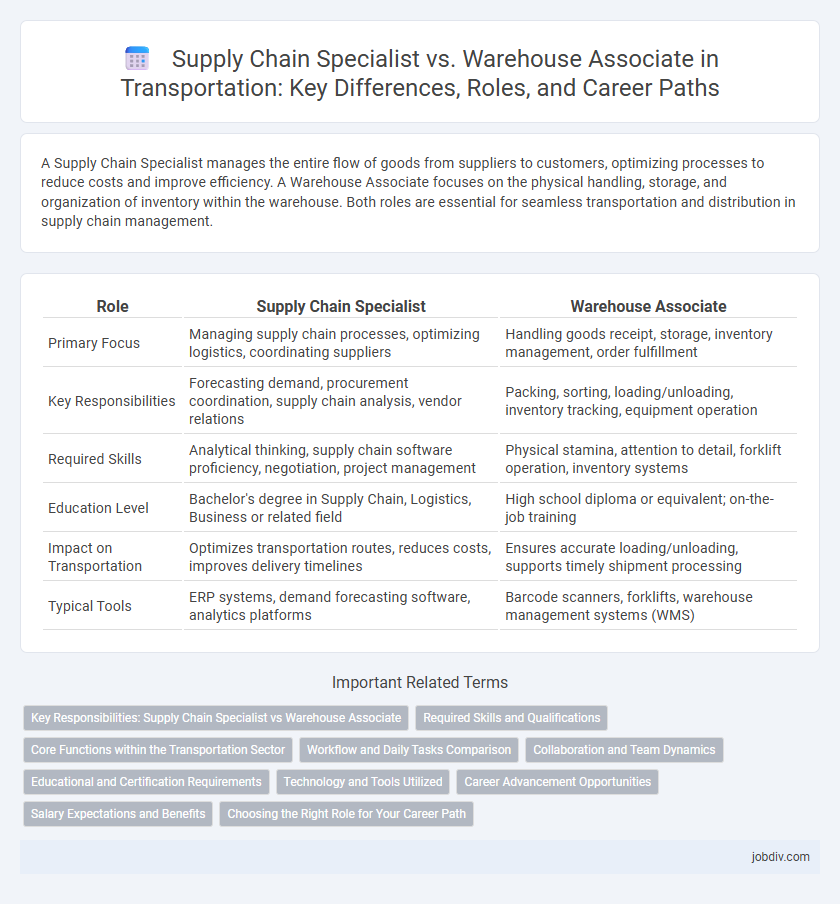A Supply Chain Specialist manages the entire flow of goods from suppliers to customers, optimizing processes to reduce costs and improve efficiency. A Warehouse Associate focuses on the physical handling, storage, and organization of inventory within the warehouse. Both roles are essential for seamless transportation and distribution in supply chain management.
Table of Comparison
| Role | Supply Chain Specialist | Warehouse Associate |
|---|---|---|
| Primary Focus | Managing supply chain processes, optimizing logistics, coordinating suppliers | Handling goods receipt, storage, inventory management, order fulfillment |
| Key Responsibilities | Forecasting demand, procurement coordination, supply chain analysis, vendor relations | Packing, sorting, loading/unloading, inventory tracking, equipment operation |
| Required Skills | Analytical thinking, supply chain software proficiency, negotiation, project management | Physical stamina, attention to detail, forklift operation, inventory systems |
| Education Level | Bachelor's degree in Supply Chain, Logistics, Business or related field | High school diploma or equivalent; on-the-job training |
| Impact on Transportation | Optimizes transportation routes, reduces costs, improves delivery timelines | Ensures accurate loading/unloading, supports timely shipment processing |
| Typical Tools | ERP systems, demand forecasting software, analytics platforms | Barcode scanners, forklifts, warehouse management systems (WMS) |
Key Responsibilities: Supply Chain Specialist vs Warehouse Associate
Supply Chain Specialists manage end-to-end logistics, including demand forecasting, inventory optimization, and vendor coordination to ensure seamless product flow. Warehouse Associates focus on receiving, storing, and shipping goods, maintaining inventory accuracy, and operating warehouse equipment for efficient order fulfillment. Both roles are critical for operational efficiency, with specialists driving strategic supply chain improvements and associates handling day-to-day warehouse activities.
Required Skills and Qualifications
Supply Chain Specialists require advanced skills in demand forecasting, inventory management, and data analysis, often needing proficiency in ERP software and strong problem-solving abilities. Warehouse Associates must possess practical skills in material handling, order picking, and operating warehouse machinery, with physical stamina and attention to detail being critical. Both roles demand effective communication and teamwork skills, but Supply Chain Specialists typically need higher educational qualifications such as a degree in logistics or supply chain management.
Core Functions within the Transportation Sector
Supply Chain Specialists oversee the end-to-end coordination of inventory flow, demand forecasting, and transportation logistics to optimize efficiency and reduce costs in the transportation sector. Warehouse Associates primarily focus on the physical handling of goods, including loading, unloading, inventory management, and order fulfillment within distribution centers. Both roles are crucial for maintaining seamless operations, but Supply Chain Specialists drive strategic planning while Warehouse Associates execute tactical warehouse functions.
Workflow and Daily Tasks Comparison
Supply Chain Specialists coordinate logistics, manage inventory forecasting, and optimize procurement processes to enhance overall supply chain efficiency. Warehouse Associates focus on daily tasks such as receiving, storing, and shipping goods while maintaining accurate inventory records. Workflow for Supply Chain Specialists centers on strategic planning and data analysis, whereas Warehouse Associates prioritize operational execution and physical inventory handling.
Collaboration and Team Dynamics
Supply Chain Specialists coordinate cross-functional teams to optimize logistics strategies, ensuring seamless communication between procurement, transportation, and warehouse operations. Warehouse Associates execute inventory management and order fulfillment tasks, working closely with supervisors and delivery personnel to maintain workflow efficiency. Effective collaboration between these roles enhances overall supply chain performance and reduces operational bottlenecks.
Educational and Certification Requirements
Supply Chain Specialists typically require a bachelor's degree in logistics, supply chain management, or business administration, with certifications like APICS CPIM or CSCP enhancing career prospects. Warehouse Associates often need a high school diploma or GED, with certifications such as OSHA forklift operator and warehouse safety training benefiting job performance. Advanced education and recognized certifications contribute significantly to higher responsibility roles and salary potential within transportation and logistics.
Technology and Tools Utilized
Supply Chain Specialists utilize advanced software like ERP systems, data analytics tools, and demand forecasting platforms to optimize inventory management and streamline supply chain operations. Warehouse Associates primarily operate automated material handling equipment, barcode scanners, and warehouse management systems (WMS) to ensure accurate order fulfillment and efficient storage. The integration of IoT devices and real-time tracking technologies further enhances the precision and responsiveness in both roles.
Career Advancement Opportunities
Supply Chain Specialists typically experience faster career advancement due to their strategic roles in managing logistics, demand forecasting, and inventory optimization, which are critical for organizational efficiency. Warehouse Associates often advance by gaining supervisory experience and developing expertise in inventory control, equipment operation, and safety protocols, leading to roles such as warehouse supervisor or logistics coordinator. The higher complexity and analytical nature of supply chain roles generally offer broader opportunities for growth into management or consulting positions within transportation and logistics sectors.
Salary Expectations and Benefits
Supply Chain Specialists typically earn higher salaries than Warehouse Associates, reflecting their strategic roles in optimizing logistics and inventory management; average annual wages range from $60,000 to $85,000 compared to $30,000 to $45,000 for Warehouse Associates. Benefits for Supply Chain Specialists often include performance bonuses, health insurance, and professional development opportunities, whereas Warehouse Associates commonly receive hourly wages with overtime pay and basic health benefits. Career advancement and salary growth prospects are more substantial for Supply Chain Specialists due to their specialized expertise and critical decision-making responsibilities.
Choosing the Right Role for Your Career Path
Supply Chain Specialists oversee the end-to-end flow of goods, optimizing logistics and coordinating with suppliers to enhance efficiency and reduce costs. Warehouse Associates focus on inventory management, order fulfillment, and maintaining organized storage facilities to ensure smooth daily operations. Choosing between these roles depends on your interests in strategic planning versus hands-on operational tasks within the transportation and distribution network.
Supply Chain Specialist vs Warehouse Associate Infographic

 jobdiv.com
jobdiv.com